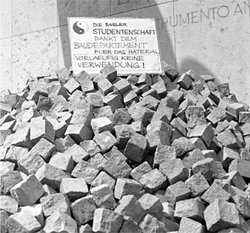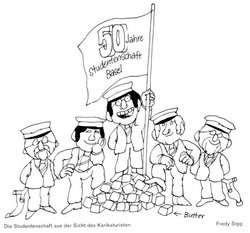

The Basel Student Union – developments since the 1960s
Harbingers of reform
In the 1960s, student self-organization by discipline began in phases (leading the way were the Clinicians’ Association, the Pharmacists’ Association, the dentists, and the chemistry students). During Max Imboden’s tenure as rector in 1964, the Student Union president was allowed to address the matriculation ceremony for the first time. The protest picnic held on St. Peter’s Square in June 1964, led by Hansjörg Renk – who later became a diplomat and spokesman for Hoffmann-LaRoche and Nestlé – along with the rector’s demonstrative participation, was aimed at the slow implementation of the long-demanded and promised cafeteria. It also signaled an increased readiness for mobilization on student political issues. The General Assembly saw better attendance than before, and instead of the official board candidate, Peter Balscheit, later a Social Democratic judge in Upper Basel, was elected as a wild card among the wildcats.
In 1964/65, new statutes were adopted once more, and by the end of 1965, a properly elected student parliament, based on the disciplinary groups, was established. In 1966, the introduction of flat-rate tuition fees temporarily became a major focus, while the cafeteria issue remained an ongoing topic. The president at the time, Markus Mohler, Faculty of Law, who later became the canton’s police chief, sarcastically commented: “The current state of affairs allows the modest hope that our cafeteria might be inaugurated at about the same time as the first kiosk on the moon.” The cafeteria was inaugurated in spring 1976; the first manned moon landing took place on 21 July 1969, at 03:56 CET.
Campaign for a new University Act
In November 1967, major university politics reached the students. The board obtained the highly confidential draft of a new University Act, secretly written behind the university’s back (including the Senate) by the Kuratel and the Department of Education (Max Staehelin, Franz Hess, and Emil Vogt). After thirty days of intensive work, the Student Union published a widely distributed counterproposal in a red-printed edition of kolibri. This set one of the main topics for the upcoming Grand Council elections in spring 1968, where students also participated with some success. Student union president Ulrich Goetz, Faculty of Philosophy and Natural Sciences, later editor of the Basler Zeitung, noted that hope had arisen that “Basel students would finally emerge from their prolonged political isolation.”
Just how far removed the university was from seriously considering the principle of participation in 1960 is illustrated by the introduction of the licentiate among law students without prior student consultation (see the protest article in kolibri 5, 24 June 1960).
Alongside the expansion of general services, such as the establishment of a student stationery store in 1967, university politics gained increasing importance throughout the 1960s. Notable was the liquidation of the student library at the end of 1966. Its collection (with books on the Second World War and the Cold War) indicated the students’ shifted interests. In May 1968, the student council decided to transform the remaining collection, dismissively called the “collection of crime novels,” into a documentation center for university matters.
Further politicization
In the 1960s, the politically engaged student body became even more politicized. While sympathies in the 1950s were clearly with the “free West,” as evidenced by reactions to the uprising in Hungary in 1956, interest increasingly turned to liberation movements in North Africa (Algeria), Vietnam, South America, Palestine, junta-ruled Greece, Franco’s Spain, etc., and self-criticism of the Western world intensified. In 1966, the issue of political engagement was addressed in a more fundamental way. In an impassioned speech at the Dies academicus (a traditional evening event of the fraternity members), the wildcat Student Union president Markus Mohler advocated for a “politicization of the university on a higher level.” The apolitical status did bring certain operational advantages but also encouraged the avoidance of necessary discussions.
The increasingly radical forces in the following years were not interested in academic debates; their engagement sought action, even if only through clear and impactful demonstrations. In a further phase of radicalization, the fundamental debate shifted to whether, in the name of a good cause, one should disregard existing regulations (the Student Union’s own statutes; the rules of self-governance of schools and universities; or on the streets when it came to demonstration bans, or possibly even bans of masks, etc.) – though it should be said that this disregard was motivated only in part by practical considerations, while also reflecting an antiauthoritarian strategy of limited rule-breaking. The legality issue was debated in the student council in November 1969 and for the first time led to the demand to abolish compulsory membership.
In January 1971, a left-wing majority in the council voted thirty-one to fifteen to remove Article 2 from the Student Union statutes, which banned political and religious statements. The left celebrated, saying they had finally found the necessary “political awareness.” However, a referendum with a ballot vote in June 1971, in which only 30 percent of students participated, reversed the decision with a four to one vote in favor of keeping Article 2. This did not truly resolve the issue, as the board still refused to adhere to the ban on political activities, and a right-wing group refused to support the left-wing board’s further political involvement at the university, even in forms compliant with the body’s statutes. In May 1974, the student body voted again in a ballot, with 60 percent opposing formal involvement in politics beyond the university. Specifically, they voted against the Student Union joining a Chile committee founded by the communist Party of Labor and the neo-Marxist Progressive Organization of Basel.
The board had by then become largely synonymous with these extramural forces. The left-wing majority on the student council was so intent on maximizing their influence that they were unwilling to give up part of the student representation in the Senate to their internal opponents, as per the proportional principle of representation established in Switzerland. All twelve seats of student power were claimed by the left, even though they constituted only slightly more than half of the council. “A unified Senate faction means increased power and influence for the student body in the future development of our university.”
Conservative uprising
Since June 1971, conservative students had published the semainier as a modest counterjournal to the kolibri. From this group emerged the three students who, in spring 1973, opposed compulsory membership by refusing to pay the thirty-two-franc Student Union fee (twenty francs for general dues and twelve francs for the scholarship fund) while still considering themselves regularly enrolled students. Additional opposition arose against the regulation in force at the time, which provided the Student Union with approximately 300,000 francs without adequate oversight.
The rectorate did not want to unilaterally reject compulsory membership, and the opponents won their case after appeals to the Department of Education and the Government Council through a decision by the Appellate Court in September 1974. A new body had to be established for determining student representation in the Senate: according to a regulation from 25 March 1975, a new sixty-member student council, elected biennially by correspondence, was established as the new electoral authority. The rectorate retained the compulsory fees but was to ensure they would be used appropriately. The old Student Union also collected voluntary contributions and participated as one of several forces in the June 1975 student council elections. Among the progressives were individuals who, having barely joined the university, were already deeply involved in Student Union politics and could only be considered genuine students with some reservations. The new regulation addressed this by requiring that one must have studied for four semesters, with at least the last two in Basel. In this election, the progressives won only twenty-four of the sixty seats, thereby becoming a minority.
The Abend-Zeitung and the National-Zeitung, both newspapers that generally supported progressive politics, accurately assessed the situation. One newspaper commented that the progressives had received a clear response for their “years of destructive and extremist politics,” while the other viewed the result not primarily as a declaration for conservative politics, but as an “uprising of the grassroots against the establishment,” which in this instance were the progressive leaders.
StuB
In 1977, the progressives once again emerged as the strongest force in the elections, winning thirty-eight out of sixty-three seats. Crucially, they were now ready to practice voluntary proportional representation in the Senate. Of the twelve seats, they took only eight and left four for their opponents. In 1978, the old organization, which had only held the status of a private Student Union since 1974, made a long-overdue shift and changed its name. From then on, it was called the Basel Student Body Association (Verband Studentenschaft Basel) with the abbreviation StuB. In 1981, the Student Council once again received university funds (20,000 francs) that it could manage independently, although the Senate had to approve the accounting.
SKUBA
In the first statute of the autonomous university from 1996, Section 27 (citing Section 21 of the University Act) legally defined the “Student Body of the University of Basel” as a public legal entity. The statute article regarding skuba was amended by a University Council decision on 27 November 1996 and remained in effect for many years. Several main points were regulated.
The Student Body would represent the interests of students, university, and education policy to the authorities and the public at the cantonal, regional, national, and international levels. Additional responsibilities were to be specified in a performance agreement with the rectorate. The Student Body would provide services to students on a private legal basis and would receive funds from the university’s global budget, membership contributions, and other income to fulfill its responsibilities. The amount of membership contributions and the deadlines and procedures for withdrawal would be set by the Senate at the request of the Student Body.
Skuba is not a representative body but the legitimate executive of the student body and the primary student contact for the university administration; the student council serves as the legislative body. Discussions about the organization of skuba took place during the comprehensive revision of the University Statute (new version from December 2007). The University Council questioned the public legal nature of skuba (and thus compulsory membership) at the time. In practice, however, the statute revision did not affect skuba’s organization and overall university importance.


